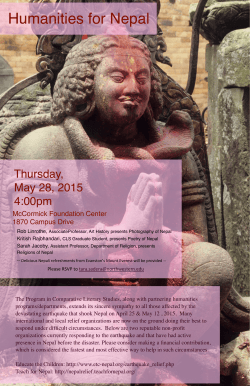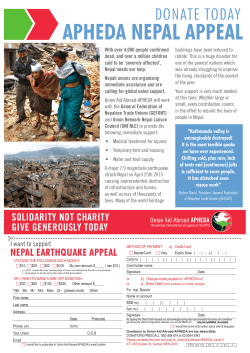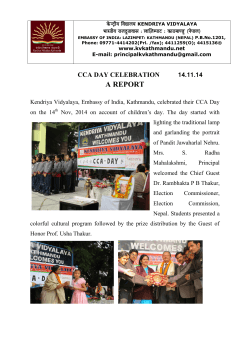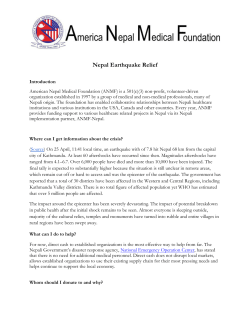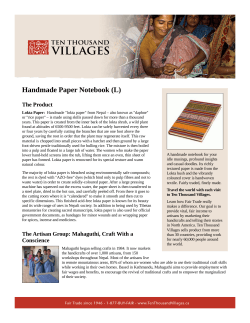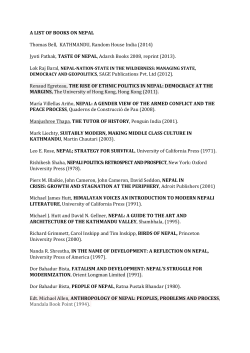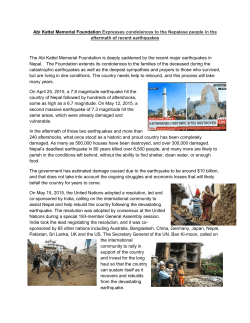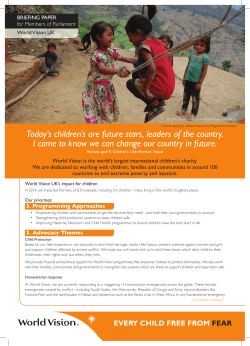
Policy Discussion Paper - Alliance for Social Dialogue
POLICY DISCUSSION PAPER -1/2012 Online Media in Nepal: Need for Policy Intervention Ujjwal Acharya Alliance for Social Dialogue Policy Research Fellowship Program 2012 December 2012 www.asd.org.np Acknowledgement I am greatly indebted to Alliance for Social Dialogue (ASD). Without their Policy Fellowship Program, this paper would not appear as it stands now. Thanks goes to ASD’s Director Hari Sharma, Deputy Director Prem Sapkota and Program Officer Shehnaz Banu for continuous support, suggestions and encouragement. Prateek Pradhan had mentored me as editor some years ago; but this time he was my mentor and his guidance was invaluable during my research. I am also thankful to my friends at the Center for Media Research – Nepal, especially Tilak Pathak, Bhuwan KC and Ujjwal Prajapati for their suggestions. Support also came from Tara Adhikari. Terhi Ylikoski, who was working with UNESCO Kathmandu Office, provided me valuable reference to media laws in Finland. I also appreciate comments received from other ASD Policy Research Fellows during our various formal and informal meetings. A lot of foundation work for this paper was conducted for the Federation of Nepali Journalists’ Digital Media Committee that I chair, and all my colleagues in the committee have indirectly contributed to this paper. Somesh Verma also provided some valuable insights. Thanks also go to online journalists, bloggers and media law experts whom I consulted during the study. Also to editors and reviewers of my paper who helped me in the finalization of the paper. I hope this work of mine will be useful in development of online media in Nepal. Ujjwal Acharya 2 Table of Contents Acknowledgement .......................................................................................................................... 2 ABSTRACT ......................................................................................................................................... 4 1. Background .................................................................................................................................. 5 2. Introduction ................................................................................................................................... 8 3. Importance of the Study ........................................................................................................... 11 4. Research Questions .................................................................................................................... 11 5. Approach and Methods............................................................................................................. 11 6. Freedom of Expression in Global Context and the Internet ............................................ 12 7. Online Media Policies in Global Context .............................................................................. 14 Finland ......................................................................................................................................................... 14 United States of America ......................................................................................................................... 15 8. Online Media Policies in Nepal ............................................................................................... 17 Legal Provisions......................................................................................................................................... 17 Practical Policies........................................................................................................................................ 18 The Internet as Media ............................................................................................................................... 18 Access to the Internet................................................................................................................................. 19 9. Conclusion .................................................................................................................................. 20 10. Recommendations ................................................................................................................ 21 Action Agenda for State......................................................................................................................... 21 Action Agenda for Media Rights Organizations ........................................................................... 22 References ....................................................................................................................................... 24 3 Policy Discussion Paper – 1/2012 Online Media in Nepal: Need for Policy Intervention ABSTRACT The tremendous development and growth of the Internet and related technology has impacted many aspects of human life. Journalism is not alien to the impact and the growing popularity of the Internet-based media threatening the printing technology. It has also empowered the individuals to play a role of communicator. The growing impact of the Internet technology has also led governments to try curb the rights of citizens. Nepal has also seen big leap in use of Internet-based media, and there are attempts to curb the freedom on the Internet. This paper argues, with examples from Finland and USA, that the state should play a role of facilitator for the growth of the Internet-based media, which contains within itself the power to bring positive changes in our society. To play such role and ensure the best positive use of the Internet and related technology for communication, the paper argues that Nepal needs to formulate online media policy. This paper is a product of the Alliance for Social Dialogue Policy Research Fellowship Program 2012. Policy Research Discussion Papers are also posted on www.asd.org.np. The author may be contacted at ujjwal.acharya@gmail.com. Findings and Conclusions expressed in this paper are those of the author and do not necessarily represent the views of ASD. 4 1. Background In last one-and-half decade, the world and Nepal have seen a tremendous growth of the Internet. Embedded within this technology is the development of online media. Online media is the use of Internet-based technologies and information infrastructure to communicate messages to the public. The advent and growth of the Internet has opened opportunities for communication that never existed before.1 The Internet has brought revolutionary changes in communication. It provides an opportunity for individuals to easily become producers, mediators, commentators and distributors of any kind of messages and opinions without additional costs, given that the individual has the access to the Internet and is using a suitable device. Access to the Internet and its infrastructure, access to devices that facilitate the access to the Internet and the contents of the Internet are three major concerns that have emerged alongside the development of the Internet. However, as this paper is focused on online media, which more or less related to the contents on the Internet, the other two concerns are only discussed where they are important for better understanding of the online media. The emergence of social media has strengthened the individual's ability to access and influence public messages. Social media refers to the combination of technologies available on the Internet for sharing information interactively and easily in various forms. This is changing the paradigm of communication at a rapid speed by enabling individuals to act as professional communicators. It is also blurring the differences between sender and receiver in the communication pattern. The Internet as a medium is so powerful and unique that it not only provides opportunity to seamlessly integrate multimedia to disseminate information and opinions but also empowers the audience, who traditionally used to be silent receivers, to step ahead in choosing and providing feedback to the contents they receive. It even enables them to become producers of the content themselves. Additionally, online media is global by nature and reaches all over the world within a matter of seconds. The changes brought about by the Internet are so tremendous that there are ongoing heated debates at the global stage on whether the Internet should be free or restricted. The core issue within these debates is individual's right to freedom of expression – basic human rights that every individual is entitled to. In June 2012, the UN Human Rights Council noted that ‘the exercise of human rights, in particular the right to freedom of expression, on the Internet is an issue of increasing interest and importance as the rapid pace of technological development enables individuals all over the world to use new information and communications technologies’ while passing a resolution calling on nations to ensure freedom on the Internet.2 The UN Human Rights Council resolution ‘affirms that the same rights that people have offline must also be protected online, in particular freedom of expression, which is application regardless of frontiers’ in line with Article 19 of the universally accepted UN Universal Declaration of Human Rights (UDHR). 1 2 Raymond and Lu 2011 United Nations 2012 5 The resolution was passed in the wake of intense debate on whether freedom of expression on the Internet should be restricted for greater good. Despite the call by a body of United Nations, in December 2012, the World Conference on International Telecommunications (WCIT) organized by International Telecommunications Union (ITU), an international body under United Nations overseeing telecommunications, proposed revision of the International Telecommunications Regulations (ITRs) including clauses to change the Internet governance. After intense debate on some proposed clauses, that some countries believed governments could use to control the Internet and therefore curtail the individual’s right to freedom of expression, the ITRs could not be passed. Nepal and 88 other nations signed it while USA, India and 53 other nations stood against it. In fact, some earlier reports have already pointed out at the efforts by governments around the world to restrict free flow of information on the Internet. Center for International Media Assistance, in a report, noted that governments in Arab region are ‘increasing efforts to monitor, filter and block websites, and harass, arrest and incarcerate activists and citizens for their online writings.’3 The Internet was a key player of the Arab Spring, a term used to describe the popular movement for democratic governance in Tunisia, Libya, Egypt and other nations of the Arab region. The Internet’s role during the Arab Spring is a positive example of the use of technology in propagating democracy and human rights. However, there are examples where the Internet played a negative role and heightened tensions and spread violence among groups. The London Riot, an event in which minorities in the United Kingdom destabilized the security system of one of the world’s most powerful democracies, forced the authority to temporarily block mobile messaging system. The recent Indian experience of ethnic violence in Assam highlighted not only the ugly face of the online media but also indicated how far the world’s largest democracy is willing to go to curtail citizen’s right to freedom of opinion and expression. India has time and again blocked, in various part of its territory, access to the Internet or some particular websites and has arrested people for simply posting an opinion on the web. Eyebrows were raised among the advocates of the freedom of the expression in Nepal when there were campaigns to misinform the public about an incident in Malaysia. Despite government’s denial of deaths of any Nepalis in the airplane crash in Malaysia, some deliberately used photos of other conflict zones around the world to claim they were images of Nepalis who died in Malaysia. The shutdown of Internet services in Arab countries as well as online filtering across the globe have demonstrated how states are trying to gain influence over the new virtual landscapes and to expand territorial law into the previously non-territorial network.4 A report by the Asian Forum for Human Rights and Development identifies four key emerging trends and concerns relating to freedom of expression on the Internet in Asia: 5 a) Heightened censorship measures during specific key political events as well as the employment of mechanisms to censor, block, or filter out online contents 3 Ghannam 2012 Hintz 2012 5 Liu and Kim 2012 4 6 b) The increasing use of existing harsh criminal law as well as introduction of new vaguely worded and overly broad laws and policies c) Increasing liability of intermediaries over online contents and the growing pressure on intermediaries to play the role of regulating the Internet d) Violation of freedom of expression, including physical threats and harassment, by non-state actors The greater role of online media, which also includes social media, in disseminating messages has somewhat undermined the role of journalism. The danger is that unverified information over the Internet could create an impact before verified work of journalism is publicly distributed. The diminishing circulation of newspapers in developed countries is associated with rise of the online media. With this shifting paradigm, online media is undoubtedly considered the future of journalism. In fact, the Future Exploration Network’s Newspaper Extinction Timeline has predicted that by 2040 AD, newspapers will be extinct due to dominance of the Internet and related technologies that paved way for online journalism, the journalistic practices on the Internet.6 The Internet has redefined the flow of information. Mass communication is trespassing into the areas that traditionally had either limited or no involvement in mass communication. Thus it is also creating new dimensions in mass communication. The new dimensions have created chaos within the traditional establishments exercising authority over the regulation, facilitation and monitoring of the means of mass communication and mass communicators. In Nepali journalism, online media has already started to become influential. Pathak claims that online journalism is mainstream journalism now as it has also established itself as one of the powerful media of the modern era.7 The Internet only extends to 23 per cent Nepalis inside the country and a large number of those who are abroad for studies and employment.8 The Internet also reaches to 3.3 per cent of households, mainly in urban areas9. The penetration of the Internet has doubled in last couple of years. The growth is already tremendous and the penetration will continue, making online media more accessible, powerful and decisive in the future. With the realization of the future potential of the online media, all traditional media dailies, weeklies and periodicals, have begun putting their contents online and establishing their online presence. Not only major publication houses avail their publication on the Internet, but also a considerable number of independent news websites published by Nepalis, from within and out of the country, have been disseminating messages to through the medium. 6 Future Exploration Network 2011 Pathak 2011 8 Nepal Telecommunication Authority 2013 9 National Report Census 2011 7 7 2. Introduction Shiva Gaunle, the president of the Federation of Nepali Journalists (FNJ), summarized the current state of the online media and called for government’s facilitation: “The use of online media is increasing in Nepal. Blogs, news portals and social networking sites have become platform to exercise the freedom of expression. But there are signs that the government is not ready to facilitate these means of expression as citizen’s exercise to the rights of expression”.10 In 2012, the then Prime Minister Dr Baburam Bhattarai’s remarks during a public ceremony provided testimony to the government’s understanding of online media. Bhattarai said: “The social networks are disseminating materials which go against the social norms, morality and public welfare, which disturb the social harmony and spread hatred and terror, and are against the national dignity and pride.”11 There is a clear gap in understanding and interpretation of role of online media among the civil society members, champions of freedom of expression and the state. While FNJ sees online media as the future of journalism and the tool for freedom of expression, the state seems to see the Internet as a potential platform for creating problems. It should be noted that Bhattarai used the same words that are used in the reasonable restrictions to the clause on the Right to Opinion and Freedom of Expression of the Interim Constitution 2007. The vaguely worded reasonable restrictions have been criticized as immeasurable conditions and their interpretations could be different due to lack of clear demarcation by the law. In addition to that, a law has been passed under a government that claims to be democratic and yet attempts to criminalize the exercise of the Freedom of Expression over the Internet. The Electronic Transaction Act, passed after the 2006 People’s Movement, has clauses that have been used to press charges against journalists. Clause 47 (A) of Act states: “If any person publishes or displays any material in the electronic media including computer, internet which are prohibited to publish or display by the prevailing law or which may be contrary to the public morality or decent behaviour or any types of materials which may spread hate or jealousy against anyone or which may jeopardize the harmonious relations subsisting among the peoples of various castes, tribes and communities shall be liable to the punishment with the fine not exceeding One Hundred Thousand Rupees or with the imprisonment not exceeding five years or with both.” The irony is, while the material of the same nature is acceptable in print, it is not acceptable online and publication of the same material can be dealt under two different sets of laws, depending upon whether it was published, in print or online media7. As international media rights organizations have noted, online media freedom is currently under a threat of harsh punishment due to such provisions in the Act,. In February 2012, an International Media Mission, consisting representatives from various international media rights organizations, visited Nepal to assess the freedom situation. The Mission issued 10 Guanle 2012 Written speech delivered by the Prime Minister Dr Baburam Bhattarai at the program ‘Beginning of Digital Signature’ on February 9, 2012. 11 8 a joint statement in which it expressed concerns over growing threats to online freedom of expression and the application of restrictive regulations on the Internet12. At present, there are a sizable number of online media run in Nepal with growing impact. News websites are functioning as news web portals and disseminating information to Nepalis in and outside the country. These sites range from institutional efforts to individual endeavors; and from industrial motives to personal hobby. The use of social media as the medium of communication and exchange of information, ideas and opinions are also increasing. By the end of October 2012, more than five million Nepalis were using the Internet with 19.92 per cent penetration in population.13 The number Nepali users in Facebook, a popular social networking site, are estimated at nearly two million; while the Bloggers Association of Nepal (BLOGAN) estimates the number of blogs by Nepalis at around 5,000 and although there is no record of online news portals, they have become a part of the greater journalism sector.14 The growth happened in the last decade. In fact, in 1999, researcher and media critic Pratyoush Onta claimed that ‘the Internet had neither brought a revolution in the lives of Nepalis at large…’ and he went on to predict ‘…nor would it in the future’15. Contrary to his forecast, ‘after historic 2006 Revolution, there has been a quantitative growth in mainly radio, television and online media’16. Despite the continuing growth of online media, the state and the stakeholders lack the policy to facilitate its growth. Apart from a few directives and small initiatives, there is no major effort to study, facilitate and understand the growth and future of online media. The parameters set by the existing media policies may not be enough. The lack of state policies on the Internet and online media has resulted in call for various mechanisms to regulate the online media, from a self-imposed code of conduct to the use of state authority and to state-imposed laws. Internet technology has also added challenges along while providing services… to save the nation from its misuse; an authority has become a necessary17. Media critics have also urged for a need of a code of conduct for online media citing that the existing code of conduct is not enough to guide online media due to its differences with the traditional media. Additional code of conduct should be prepared for online media as per its characteristics18. Although the Internet is considered a free medium, there has also been an advocacy for laws to regulate its functions. In an article published in Sahita, the quarterly journal of the Press Council of Nepal, Ek Raj Pathak states, “The need is clear for a separate media law for online for its registration, management, renewal, monitoring and other legal aspects.”19 12 The International Media Mission 2012 Nepal Telecommunication Authority 2012 14 Interview with KP Dhungana, the president of Online Journalists Association, and co-coordinator of Bloggers Association of Nepal (BLOGAN) in August, 2012. 15 Onta 2006 16 Luitel 2012 17 Bidrohi 2011 18 Luitel 2011 19 Pathak 2012 13 9 It’s not that the state has not been aware of the growth of online media. Pathak points out to a constitutional provision a state practice to prove that it has been aware of online media: The new constitution (Interim Constitution 2007) has a provision for rights to publication, broadcasting and electronic publication under fundamental rights… the Department of Information has provision to issue press identity card for the online journalists, and thus the state has taken it equivalent to any other medium of journalism15. In fact, the Interim Constitution of Nepal 2007 recognizes online media as any other media, the first constitution of the country to explicitly do so. In Article 15 sub-clause 1, it clearly states that no media, including electronic publication, broadcasting and press, shall be subject to prior censorship. In sub-clause 2 of the provision, the Constitution protects any broadcasting, publishing or printing of material using radio, television, online or other types of digital or electronic equipment or medium from closure, seizure or cancelation of registration because of such broadcasting, publication or printing. Before the Constitution was promulgated, the High Level Media Advisory Commission in 2006 recommended a few measures for the promotion of online journalism. Noting that online media is a more democratic, liberal and unstoppable source, the Commission report said ‘it is against the nature of technology to keep the online journalism under the purview of the law’20. The Commission recommended a two-way strategy to match the Internet’s nature and develop online media: There should be no requirement for the online newspapers to register with the government. But if anybody wants to register company and publish newspaper through online by using editorial manpower as per the standards of professionalism, credibility and journalists, the company should have an option to achieve recognition and facility of printing media17. However, in an era of growing impact of the Internet, it is necessary to have some kind of framework to ensure fair use of the medium as everyone – people, governments, companies and different groups – is using it for all kind of motives and ends, including political ones21. Due to this, even democratic governments are increasingly interested in implementing control-mechanisms on the Internet and its content. The prediction about challenges of online journalism a decade ago hasn’t died out: online journalism will surely face many legal and ethical challenges in the future.22 20 HLMAC 2007 MacKinnon 2012 22 Osborn 2001 21 10 3. Importance of the Study This discussion paper is relevant as it situates online media in the broader journalism context by analyzing the historical development, current situation, its policies, and laws. To understand the best policy practices governing online media, short analysis of the policies of one of the world’s freest countries, Finland, and that of the global advocate of freedom of the Internet, United States of America, have been included in this paper. These sections will provide the best practices policy in the global context making it easier to contrast and compare with Nepal’s policies and context. This is particularly useful to understand online media in global and local context. At a time when the online media is gathering momentum and the Internet is playing key roles in political and social change, both for good and bad, it is important for a country like Nepal which is in political transition, to formulate policy governing the medium. Policy on the Internet and online media is a clear necessity, and this paper facilitates the formulation of principles upon which the policy may be based. The analysis and recommendations of the paper may help to shape the online media in Nepal as the concerned authorities and stakeholders will have a base for advocacy and formulation of plans and policies. State authorities such as Ministry for Information and Communication, quasigovernmental bodies such as Press Council of Nepal and associations like Federation of Nepali Journalists and Online Journalists Association may use this paper to plan the future course of regulations or to facilitate the development of the sector. 4. Research Questions The paper attempts to assess Nepal’s policy preparedness for online media by looking at the following key research questions: 1. Are there adequate policies to govern online media? Does the growth of online media demand policy intervention by the state? 2. Do the existing policies and practices facilitate the development of the Internet as a frontier of freedom of expression and online media as the future of mass communication? 3. What level of intervention by civil society organizations is required to ensure optimal growth of the online media? 5. Approach and Methods I have approached these research questions with a participatory worldview and also take up advocacy. I begin with social agenda of growing concerns about online media and conclude with action agenda for change. The approach is based on the basic values and norms of democracy and open society where right to freedom of opinion and expression is the key requirement for the society to be able to provide common ground for pluralistic views and opinions to be openly discussed. The principles of equality, tolerance and co-existence for social change have been key ideas behind the discussions, analysis and recommendations of this paper. 11 This paper is based on the information gathered by two methods. 1. Review of documents: I have extensively reviewed public documents such as policies, laws, regulations, government directives and decisions along with policies and papers prepared and presented by experts, stake holding associations and communities. I have also reviewed some relevant international public documents, including policies of Finland and United States of America to provide the global context of best practices. 2. Schedule interview: I interviewed and consulted select experts on journalism, online journalism, media rights and law; and editors of select online publications and bloggers. Their inputs have been incorporated throughout the paper but they were also instrumental while writing the policy intervention recommendations of the paper. 6. Freedom of Expression in Global Context and the Internet Freedom of expression is the fundamental human rights. The Universal Declaration of Human Rights (UDHR), a milestone document in the history of human rights. Proclaimed by the United Nations General Assembly in Paris on 10 December 1948, the document sets out fundamental human rights to be universally protected. Article 19 of the UDHR states: Everyone has the right to freedom of opinion and expression; this right includes freedom to hold opinions without interference and to seek, receive and impart information and ideas through any media and regardless of frontiers.23 The UDHR does not distinguish between medium and states that the freedom of expression implies to any media. Although the Declaration is a standard yardstick of human rights, it is not legally binding for the member states of the United Nations. The legally binding multi-lateral treaty at the United Nations that frames freedom of expression as the fundamental human rights is the International Covenant on Civil and Political Rights (ICCPR) which the UN General Assembly adopted by and opened for signature on 16 December 1966. This covenant entered into force on 23 May 1976. Article 19 of the ICCPR states that ‘everyone shall have the right to hold opinions without interference’ and ‘the right to freedom of expression; this right shall include freedom to seek, receive and impart information and ideas of all kinds, regardless of frontiers, either orally, in writing or in print, in the form of art, or through any other media of his choice.’24 It also states that the exercise of rights carries special duties and responsibilities and ‘it may therefore be subject to certain restrictions, but these shall only be such as are provided by law and are necessary for respect of the rights or reputations of others; and for the protection of national security or of public order, or of public health or morals’.21 The Covenant has 74 signatories and 167 parties to it. Nepal signed and accessed the Covenant on 14 May 1991, following the dawn of multi-party democracy and was thus 23 24 United Nations 1948 United Nations 1966 12 legally bound to observe the Covenant. The covenant also does not discriminate between media. However, freedom on the Internet and exercise of the right to freedom of expression on the Internet, however, is being globally debated. Many nations are seeking to restrict and regulate the exercise of freedom of expression on the Internet advocating that the nature of the media requires greater restrictions to ensure public order. At the United Nations, the growing consensus is for freedom of expression on the Internet. The UN Human Rights Council, on 29 June 2012, unanimously adopted a resolution on ‘The Promotion, Protection and Enjoyment of Human Rights on the Internet,’ noting that ‘the exercise of human rights, in particular the right to freedom of expression, on the Internet is an issue of increasing interest and importance as the rapid pace of technological development enables individuals all over the world to use new information and communications technologies.’25 The resolution clearly states that online media should be viewed same as any other media while ‘affirming that the same rights that people have offline must also be protected online, in particular freedom of expression, which is applicable regardless of frontiers and through any media of one’s choice, in accordance with articles 19 of the Universal Declaration of Human Rights and the International Covenant on Civil and Political Rights.’ A year earlier, in June 2011, UN Special Rapporteur on freedom of expression Frank La Rue had submitted a report to the UN Human Rights Council strongly advocating for freedom on the Internet, condemning censorship and surveillance practices of authoritarian regimes, and warning of dangerous trend emerging in the democratic nations that could threaten human rights. Neither La Rue nor the Council has the power to compel any government to do anything, however, the moral weight of the Council has nonetheless helped to draw global media attention on a broad range of governments that threaten Internet freedom.26 A report by UNESCO in 2011 also concluded that ‘freedom of expression is not an inevitable outcome of technological innovation’ and that ‘it can be diminished or reinforced by the design of technologies, policies and practices – sometimes far removed from the freedom of expression’. With growing threat to the freedom of individuals on the Internet, a group of digital rights activists and organizations issued the Declaration of the Internet Freedom proclaiming that they ‘stand for free and open Internet’ and ‘support transparent and participatory processes for making Internet policy and the establishment of five basic principles: expression, access, openness, innovation and privacy’.27 Two of the declaration’s principles are expression which states ‘don’t censor the Internet’, and openness which states, ‘keep the Internet an open network where everyone is free to connect, communicate, write, read, speak…’ both these principles are directly related to the freedom of expression. Signed by more than 1,300 individuals and organizations, the 25 United Nations 2012 MacKinnon 2012 27 ‘Declaration of Internet Freedom’ http://www.internetdeclaration.org/ 26 13 declaration is civil society’s push for keeping the Internet free and freedom of expression intact in the Internet. 7. Online Media Policies in Global Context Finland Reporters Without Borders and Freedom House, both, rated Finland as the freest country in terms of media freedom in 2011. The Finnish Constitution’s Article 12 guarantees the freedom of expression and access to information. In general, journalists and media outlets are allowed to operate freely and without threats and fear of repercussions.28 The everyday media practice in Finland gives evidence of a fairly large freedom of expression in the country and of a favorable framework for the media to perform according to the principles of a democratic society.29 Finland represents the democratic corporatist media model, which combines strong state intervention with high professionalism and large media autonomy. The state takes responsibility for securing for the media, an environment that guarantees a large freedom of expression and simultaneously creates mechanisms for a responsible use of the freedom through legislations.26 The Freedom House report further adds that the only requirement of the online media is to name a responsible editor-in-chief and archive published materials for at least 21 days so that the Finnish citizens can ‘exercise the legal rights to reply and the right to have falsely published information corrected, in internet-based and traditional media alike.’ In terms of content regulation, basically the same requirements apply to the Internet as to the other media.26 The freedom of expression rights are further secured by the Act on the Exercise of Freedom of Expression in Mass Media, which became effective at the start of 2004, and it applies to all publishing and program making. It defines network message as information, opinion or some other message provided to the public by means of radio waves, electronic communications network of some other comparable technical arrangement. Communication via information networks is part of the Act and is therefore subject to legislation of mass media.30 The Act’s only provision regarding private individual’s online media is that they need to ensure, where necessary, that responsibility is borne for any crime or damage. The Act states that when a private individual maintains a web site on an electronic communications network, he or she shall be subject to the provisions of criminal and tort/compensation liability arising from the contents. The Act, in section 16, also entitles the originator of a message, the publisher and the broadcaster the right to maintain confidentiality of the source of message. This is also applicable to any individual’s web sites. Section 18 of the Act ensures that investigating authority can only seek information regarding the content once the court establishes the 28 Freedom House 2011 Kuutti, Lauk and Lindgren 2011 30 Jyrki 2010 29 14 content as criminal offence. In such case, the court can also order the destruction of the message. The Act also exempts intermediaries involved in technical production, transmission, intermediation and distribution of message, from any liability of the contents of the message. Their only liabilities are releasing identifying information of the message and stopping distribution of the message upon court orders if the messages are found to be of criminal offence. They can only be sued according to penal code if they are unwilling to remove the illegal material in their websites even if they are aware of its problematic characters (concerning with racist and hate speech, child pornography).26 In a few rare cases of judicial intervention on the contents of the online media, the cases have been dealt under civil offence. In 2009, a blogger was charged with racist comments and defamation of religion in a blog comment about the Prophet Mohammad and Somalis. The court upheld one of the charges as defamatory practice. In September 2011, a man made a threat against a minister. This case led to the first prosecution of a threat made on Facebook and the man who made the threat was convicted.31 Finland, however, practices a self-regulatory process. The Council for Mass Media, set up by publishers, journalists and their associations to act as a self-regulatory body for mass media content, cultivates responsible freedom of mass media. The monitoring of harmful Internet contents is currently undertaken by the Council, by the Finnish Information Processing Association’s Ethics Advisory Committee, the Council on Ethics in Advertising, the Consumer Agency and the Consumer Ombudsman.32 The Council publishes a set of journalistic guidelines, which was last revised in 2011. The guidelines and their revision can be interpreted as good professional practice. The purpose of the guidelines is completely different from the legislative regulation of the freedom of speech as they are created for self-regulation in the mass media by defining good journalistic standards and ethical guidelines for journalists.33 The Council does not exercise legal jurisdiction and its decisions on the contents are based on the guidelines, which cover all journalistic works in the press, television, radio, and Internet, giving equal treatment to each of these media.29 United States of America United States of America is neither among the freest country on media nor in the Internet despite having one of the world’s strongest systems of legal protection for freedom of the press. Reporters Without Borders in 2011 ranked USA at 47 in the Press Freedom Index. Freedom House although classified the Internet freedom in USA as free, it recorded 13 incidents including seven violations of user rights, four limits on content and two instances of obstacles on access.34 31 Freedom House 2011 Jyrki 2010 33 Kuutti, Lauk and Lindgren 2011 34 Freedom House 2011a 32 15 USA's famed First Amendment to US Constitution explicitly expresses that 'Congress shall make no law… abridging the freedom of speech, or of the press'. As a result, government regulation of the media must not only be unobtrusive but also must be sufficiently justified to meet the limits of the First Amendment.35 The First Amendment provides the core guarantee of press freedom and freedom of speech. While those rights have come under pressure at various times in the country’s history, the independent court system has repeatedly issued rulings that protect and expand the right of journalists to remain free of state control.32 The Freedom House report ascertained: Access to the Internet in the United States remains quite free compared with the rest of the world. Users face few restrictions on their ability to access and publish content online. The courts have consistently held that federal and state constitutional prohibitions against government regulation of speech apply to material published on the Internet. In addition, statutory immunity for online service providers continues to play an important role in fostering business models that permit open discourse and the free exchange of information. However, several developments in recent years have placed the government and the Internet freedom advocates at odds over aspects of the Internet regulation as well as issues surrounding online surveillance and privacy31. US government has maintained broad surveillance power to combat terrorism, child pornography and crimes. As Americans have grown increasingly dependent on the Internet and cell phones, laws have been passed and policies implemented that make it vastly easier for government agencies to track down and access citizens’ private digital communications. Such surveillance is much easier than the surveillance of physical homes, offices, vehicles, and mail36. The content of online media is free from government interference as US employs no filtering mechanism. Users with opposing viewpoints engage in a vibrant online political discourse, and face almost no legal or technical restrictions on publication or access.37 There is no direct regulation on content but content is not immune from other legal rules such as copyrights law, child pornography, protection of minors, defamation, harmful content and cyber crimes. Internet freedom advocates have criticized USA's response to release of diplomatic cables by WikiLeaks, especially the unaccountable engagement with private companies. Rebecca MacKinnon wrote that the response to WikiLeaks’ release of classified cables is a troubling example of private companies’ unaccountable power over citizens’ political speech and of how government can manipulate that power in informal and thus unaccountable ways. This opaque manipulation is done in ways most that people are unaware of. In some cases citizens may even support such a manipulation because they believe it does not affect them as law-abiding citizens and they may continue to believe that until they or someone they care about find themselves to be politically marginalized or vulnerable, or find that their rights have been violated for whatever reason.33 35 Baron 2003 MacKinnon 2012 37 Freedom House 2011a 36 16 However, US authorities do not provide bloggers and new media practitioners the same status or protection or rights as journalists. Police departments in New York City and elsewhere denied formal journalist status to some new media practitioners who applied for accreditation to cover the Occupy protests.34 There are a few court verdicts in USA where this issue has come to discussion and debate. In a controversial case, a US federal judge ruled that a blogger was not acting as a journalist when she issued polemical attacks online directed at an attorney.34 Although the US government does not restrict political or social engagement over the Internet, there is still a strong push to pass legislation regarding to curtail certain online activities and content.33 8. Online Media Policies in Nepal Legal Provisions Freedom of Expression is a constitutionally guaranteed right in Nepal. The Interim Constitution 2007 states: ‘Every citizen shall have freedom of opinion and expression’ in Article 12 (3) (a). However, the constitution also has provisions of ‘reasonable restrictions’ under which the rights to freedom of expression could be curtailed by the law if the content may undermine the sovereignty and integrity of Nepal, or may jeopardize the harmonious relations subsisting among the peoples of various castes, tribes, religions or communities, or on any act of defamation, contempt of court or incitement to an offence, or on any act which may be contrary to public decency or morality. The constitutional protection of the rights to freedom of expression is extended to online media. Article 15 (1) of the Interim Constitution 2007 protects all forms of media from censorship and other intervention and states that no publication, broadcasting or printing of news items, editorial, article, writings or other readings, audio-visual materials, by any means including electronic publication, broadcasting and press, shall be censored. Furthermore, Article 15 (2) protects any broadcasting, publishing or printing of material using radio, television, online or other types of digital or electronic equipment or medium from closure seizure or cancelation of registration because of such broadcasting, publication or printing. Since, the constitution has included online as a medium of information exchange under the constitutional rights of press and publication, ideally the existing Press and Publication Act 1992 should have guided the freedom of expression over the Internet. However the Act was implemented when the Internet was still at a nascent stage and has not been updated to include provisions to include online media. In this situation, the content in the Internet follows the Section 47 of the Electronic Transaction Act 2006. The Section 47 (1) of the Act states that if any person publishes or displays any material in the electronic media including computer, internet which are prohibited for publication or display by the prevailing law or which may be contrary to the public morality or decent behaviour, or any type of material which may spread hate or jealousy against anyone or which may jeopardize the harmonious relations subsisting among the peoples of various castes, tribes and communities shall be liable to the punishment with the fine not exceeding One Hundred Thousand Rupees or with the imprisonment not exceeding five years or with both. 17 The Some Public (Crime and Punishment Act 1970) also prohibits publication of obscene materials. Section 2 of the Act states “no person shall commit any of the following acts: (c1) print or publish any obscene materials by using obscene language or by any word or picture which denotes obscene meaning; or exhibit or sell or distribute such obscene publication in public place other than for the purpose of public health or health science”.38 However, legal experts have pointed out that the Section is vague and never been adequately explained by the court. Other legal provisions that govern the Internet media are included in the Telecommunication Act 1997, the Narcotic Drug (Control) Act 1971. The Narcotic Drug (Control) Act also allows surveillance by taping or censoring the content in order to control narcotic drug trade. Section 10 of the Act states that if there is an order from investigating authority or judicial authority the Narcotic Drugs Control Officer, in course of investigation of narcotic drugs, may tape electronic devices like telephone, telex, fax of the person related to narcotic drugs, may receive copy, or may take photograph, and may censor any sort of document to be received from post like letter, parcel document. The Telecommunications Act vests special powers to the Government of Nepal such as the order to tape information, the authority to trace the transmitter of the information or to stop such information or to control transmissions system in a case related to any specific subject, person or community during state of emergency or in case of national security issue. One of the functions of the Nepal Telecommunications Authority, formed in accordance of the Act, is to ‘to regularize and systematize Telecommunications Service’ that includes licensing the Internet Service Providers (ISPs). Section 15 of the Act empowers the Authority to issue orders or directives including carrying out the particulars of activities and providing back information collected during the activities. These directives are mandatory for the licensees. Practical Policies The state and its agencies have issued directives and taken decisions as and when required relating to the online media. Those policies established by directives and decisions help understand the state’s policy on the Internet and also analyze the interpretations, and misinterpretations, of the legal provisions. Those policies established by practice are grouped under two separate categories, namely the Internet as media and access to the Internet. The Internet as Media In June 2003, the Ministry of Information and Communication decided that those journalists working in the online service could be availed with press representative card issued by the Department of Information. Responding to the Department’s request to policylevel decision after journalists Bipin Sharma Mishra and Saroj Nepal applied for the press card, the Ministry’s section on press and information coordination wrote: ‘The press card could be availed to [journalists working for online services] if the application is received in accordance to Section 20 (1) of Press and Publication Act 1992 and Regulation 9 (1) (2) of the Press and Publication Regulations 1993.’ 38 For examples, see Aryal 2011 18 The Department of Information has since then availed online media, operated under the Company Act up to six press cards. To receive the cards, the online media is required to agree to 10-point terms that includes following the existing laws, journalistic ethics and owning complete responsibility for its published content. The online media with press card also comes under the jurisdiction of the Working Journalists Act. The Public Service Advertisement Distribution to Electronic Media Guidelines Directives, adopted in January 2010, defines electronic media as legally registered television, radio and online. It also has provisions for government’s advertisements to be given to online media after classification but so far no online media have applied for the classification. However, the two documents clearly establish the Internet as a media thus recognizing the online media as a component of larger media system. Access to the Internet Access to the Internet as a fundamental right that every state should provide to its citizens, has two separate dimensions. The first, related to access to connection or infrastructure, needs to be separated from access to content. According to Census 2011 National Report, only 3.3 per cent households of Nepal have the Internet connection whereas Nepal Telecommunications Authority puts the Internet penetration in population at around 19 per cent. Although the access of Internet connection among Nepalis is low, the government has been largely supportive of the expansion of the Internet. There is relatively simple procedure on access or getting the connection to the Internet service.39 The ISPs are required to maintain log of the subscribers and their details under a directive from NTA issued in August 2010 under request from Nepal Police. Access to the content on the Internet is largely unrestricted. However, there are a few practices enough to alert the Freedom of Expression on the Internet activists that could lead to the harsher restriction. In November 2005, the then King Gyanendra Shah cut off all communication channels including access to the Internet for six days. The loss due to the cutoff is yet to be assessed; the procedure implemented has yet to be analyzed and the practice yet to be examined. In October 2010, the Ministry of Home Affairs and NTA started practice of content regulation. The Ministry, issuing a public notice, imposed liability to ISPs and concerned authorities to stop transmitting or broadcasting or publishing those contents prohibited by Section 47 of Electronic Transaction Act 2006. Earlier, NTA had amended license terms of all the ISPs incorporating certain clauses that imposes ISPs to block the website that consists of contents undermining sovereignty, integrity and national interest of Nepal and that amounts to treason; any obscene content; child pornography and such websites; and any other website as directed by NTA. Owning to the terms and utilizing the power provided by Section 15 of Nepali Telecommunications Act, NTA for the first time sent a list of dozens of websites it deemed objectionable to be blocked in October 2010. The list included prestigious sites and news sites.40 Currently, 93 URLs remained blocked by ISPs 39 Aryal 2011 Nepali Times, October 28, 2010. Accessed on December 12, 2012. http://www.nepalitimes.com/blogs/thebrief/2010/10/28/nepal-bans-huffingtonpost-com/. 40 19 as directed by NTA.41 The NTA currently issues a directive to block a URL if it receives a complaint from general public and finds the websites objectionable. It’s not only state which is blocking access to the Internet. There are as least two incidents where the Internet Service Providers’ Association of Nepal (ISPAN) called ISPs to cut off the Internet for their subscribers in protest to the government. In April 2011, they blocked the access to the Internet for an hour protesting government’s policy to held ISPs liable for the misuse of the Internet service by their customers. The one-hour blackout was also carried out by ISPs in 2007. 9. Conclusion The online media is considered as a part of larger media system and has been accorded all rights applicable to media constitutionally in Finland, USA and Nepal. However, the difference is that in Finland and USA, the Acts that governs the media clearly define the online media and their provisions explicitly cover all aspects of the online media, in Nepal, the media laws only name the online media as a part of the larger media system and are yet to further elaborate on online media as a specific form of media. This is true even for directives and decisions. The Public Service Advertisement Distribution to Electronic Media Guidelines Directives 2010 is a case in point. It explicitly states a few instances where it includes online media; however, it has neither provisioned a clearly stated mechanism nor established a procedural system to avail the benefits. The Electronic Transaction Act is basically envisioned to ensure the smooth electronic transaction and ideally, it has nothing to do with the content of the Internet unless the content interferes with the transaction system, which is unlikely. However, it consists of a provision that could be used for all content in the Internet. The provision was included in a rush to ‘address the growing concerns about contents of the Internet as it didn’t seem possible that a separate Act for Internet content was coming soon.’42 In absence of clear laws, the state agencies are also arbitrarily taking decisions and directing stakeholders. The procedure that Nepal Telecommunications Authority uses to block sites or Nepal Police to gain information about the Internet users are arbitrary and they are not held accountable for such practices. In Finland too, such powers lie with the security agencies but they need to avail the court’s order within a short period of time, so they are held accountable for their actions. To sum up, there is a constitutional recognition of the online media and the freedom of expression on the Internet and they are mentioned in laws and relevant documents drafted thereafter. However, the media laws lack explicit explanatory provisions to govern the aspects of the online media, leaving loopholes that can be used to restrict the development and functioning of the online media. 41 42 Saptahik, September 7, 2012 Interview with Kashiraj Dahal, a drafter of the Electronic Transaction Act, 2012 20 10. Recommendations The Internet-based media is the future of mass communication and its effectiveness could be greater than that of traditional mass media. There is an opportunity to further develop this media. There is however, also a considerable risk as the implication of the medium could be beyond state’s capacity to effectively govern. This calls for serious homework to create appropriate policies in time. The recommendations here are divided into two sections. First part consists of recommendations that need to be adopted by the state or state parties. However, those recommendations are also relevant for civil society organizations and rights activists to identify what they need to advocate for. The second part of the recommendations is entirely for media rights organizations such as Federation of Nepali Journalists (FNJ), Media Society and Online Journalists Association among others, to ensure the development of the online media and the freedom of expression on the Internet. Action Agenda for State Revision of existing media laws/provisions 1. The Constitution should include rights to access the Internet as a fundamental right of all citizens and the provision for rights to freedom of expression should be explicitly defined as applicable to the Internet. 2. The Press and Publication Act 1992 and the National Broadcasting Act 1993 need a revision to incorporate aspects of the online media. They were drafted when the Internet was still at its infancy in Nepal, and the online media were just starting therefore the laws do not cover the online media. Inclusion of online media in the Acts in accordance to the constitutional spirit will effectively bring the newest medium under jurisdiction of existing media institutions. 3. Similarly, Press Council Act 1992 also needs a revision to bring the online media under its jurisdiction for ensuring the ethical practices in online journalism. 4. Section 47 of the Electronic Transaction Act should immediately be suspended as it criminalizes the freedom of expression. 5. The Telecommunications Act should establish a clear procedure for blocking content deemed illegal on the Internet and surveillance over Internet users requiring judicial orders within a short period of time. However, it should 21 be noted that the blocking of content should only be deemed necessary under very specific conditions clearly stated in the law. 6. To address a growing concern about the content in the Internet, the laws regarding privacy, defamation and libel, such as Libel and Slander Act 1959, on the Internet should be revised to include harsher fines to any offence. 7. Criminal laws, such as Crime against State and Punishment Act 1989 and Some Public (Crime and Punishment) Act 1970 should be revised to include harsher punishment to anyone committing criminal offences using the Internet. The criminal laws should also clearly define the hate speech and child pornography to make them a criminal offence. Issuance of the Internet use guidelines 8. The state should immediately start work on the Internet use (social media) guidelines for the government employees. The guidelines should be taken to wider public and stakeholders for consultation before finalization. The guidelines will govern the government employees and provide a baseline guide to the ordinary citizens for the use of the Internet. Long-term action agenda for the state 9. The state needs to immediately work out curricular contents regarding the Internet literacy in school levels to ensure that citizens are well informed about the technology, its usages and impacts, along with its possible negative impact on the society. 10. The state should also plan wider dissemination of materials containing information on the Internet literacy. It will serve two proposes: First, it will help citizens to utilize the power of the technology, and second, it will minimize the harms and negative impacts of the Internet. Action Agenda for Media Rights Organizations 11. The Media Rights Organizations should consider the Internet as a means of mass communication, and an effective platform for citizens and media to exercise their right to freedom of expression and should continue advocating for a free and unrestricted access to the Internet and its contents. 12. The Media Rights Organizations should issue and encourage its member organizations to issue a social media guideline to the members and employees. 22 13. For free, fair and sound Internet content, the Media Rights Organizations should set up a self-regulatory mechanism to monitor contents on the Internet. *** 23 References Acharya, Krishna Prasad. 2005. ‘Ethical Consideration of Nepal’s Online Media’ (unpublished paper). Kathmandu: Central Department of Journalism and Mass Communication, Tribhuvan University. Acharya, Ujwal, Tilak Pathak, Bhuwan KC, Bikash Karki, Rajneesh Bhandari Umesh Shrestha and Rishikesh Dahal. 2012. ‘Journalist and Social Media: 2011 National Survey on Nepali Journalists.’ Kathmandu: Center for Media Research – Nepal. Aryal, Babu Ram. 2011. ‘The Situation of Freedom of Expression in Internet in Nepal’ (Unpublished paper). Kathmandu: Internet Society Nepal. Carlson, David. 2005. ‘The Online Timeline.’ Accessed August 12, 2012. http://iml.jou.ufl.edu/carlson/1990s.shtml. Devkota, Balaram. 2005. ‘Online Media in Nepal’ (unpublished paper). Kathmandu: Central Department of Journalism and Mass Communication, Tribhuvan University. Freedom House. 2011. ‘Freedom of the Press 2011 – Finland.’ Accessed September 7, 2012. http://www.unhcr.org/refworld/docid/4e70938928.html. _____. 2011a. ‘Freedom of the Net 2011 – United States of America.’ Accessed September 12, 2012. http://www.freedomhouse.org/sites/default/files/inline_images/United%20States_FO TN2011.pdf. _____. 2012. ‘Freedom of the Press 2012 - United States.’ Accessed September 7, 2012. http://www.unhcr.org/refworld/docid/5049e258c.html. Future Exploration Network. 2011. ‘Newspaper Extinction Timeline.’ Accessed September 7, 2012. http://futureexploration.net/Newspaper_Extinction_Timeline.pdf. Gaunle, Shiva. 2012. ‘Challenges of Protecting Freedom and Professional Safety.’ In ‘Annual Press Freedom Report,’ edited by Ujwal Acharya and Somesh Verma. Kathmandu: Federation of Nepali Journalists. Ghannam, Jeffrey. 2011. ‘Social Media in the Arab World: Leading up to the Uprisings of 2011.’ Washington: Center for International Media Assistance. Hintz, Arne. 2012. ‘Challenging the Digital Gatekeepers: International Policy Initiatives for Free Expression.’ Journal of Information Policy 2. HLMC. 2007. ‘High Level Media Commission Report.’ Kathmandu: HLMC. Jyrkiainen, Jyrki. 2010. ‘Media Landscape: Finland’. Accessed September 8, 2012. http://www.ejc.net/media_landscape/article/finland. Kshetri, Indra Dhoj. 2008. ‘Online News Portals in Nepal: An Overview.’ Bodhi: An Interdisciplinary Journal 2(1): 260-68. Kuutti, Heikki, Epp Lauk and Marko Lindgren. 2011. ‘Does Media Policy Promote Media Freedom and Independence? The Case of Finland.’ Mediadem, European Commission. 24 Liu, John and Sejin Kim. 2012. ‘Internet and Social Media in Asia: Battleground for Freedom of Expression.’ Bangkok: Asian Forum for Human Rights and Development. MacKinnon, Rebecca. 2012. Consent of the Networked: The Worldwide Struggle for Internet Freedom. New York: Basic Books. Onta, Pratyoush. 2006. ‘Beyond the Internet Hoopla.’ In Mass Media in Post-1990 Nepal, edited by Pratyoush Onta. Kathmandu: Martin Chautari. United Nations. 1948. ‘The Universal Declaration of Human Rights.’ http://www.un.org/en/documents/udhr/index.shtml. _____. 1966. ‘International Covenant on Civil and Political Rights.’ http://www2.ohchr.org/english/law/ccpr.htm. _____. 2012. ‘The Promotion, Protection and Enjoyment of Human Rights on the Internet. http://daccess-dds-ny.un.org/doc/UNDOC/LTD/G12/147/10/PDF/G1214710.pdf. Washburn, David. 2005. ‘History of Online Journalism.’ New York: University of Albany, USA. In Nepali Bidrohi, Madhav. 2011. ‘Facebook ka Farak Farak Fanda.’ Samhita Quarterly 11. Luitel, Hari Govinda. 2011. ‘Sancharma Aba Ke Garnu Parchha.’ Samhita Quarterly 11. Pathak, Ek Raj. 2012. ‘Online ko Anushashan.’ Samhita Quarterly 12. 25
© Copyright 2025

